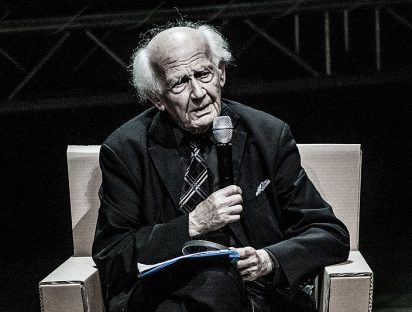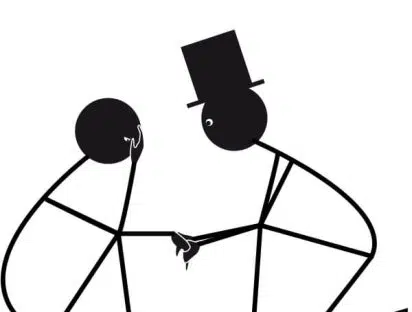Our previous post dealt with the influence strategies of some multinational companies. Designed to protect their material interests, these strategies are denounced by citizens and NGOs who consider that they not only worsen the ecological crisis, but also that they use brutal methods, e. g. various forms of intimidation. Somewhat surprisingly, the descriptions they proposed – which were the basis of our post – could have been applied to an authoritarian political regime. Hence the following conjecture: if the power of some multinationals is similar to the power of dictatorial political regimes, should opposition and resistance strategies also be inspired by those aimed at fighting such regimes? In this article, I discuss a strategy that was proposed in the late 1970s by the Czechoslovak philosopher and mathematician Václav Benda: the creation of a “parallel polis” – a phrase which could be translated as “parallel city” or “parallel civil society.” My intention here is not to show that such a project should be implemented in order to bypass the questionable influence strategies of certain multinational companies – there are now alternative lifestyles and many initiatives that could be similar to Václav Benda’s idea (1). It is rather to explore the possible extension of the “parallel polis” to this kind of case.
1.
Václav Benda was also a dissident at a time when Czechoslovakia had the status of a “people’s democracy.” Co-author of Charter 77, which was published on 1 January 1977 (2), he wrote a short essay on 17 May 1978 entitled “The parallel ‘polis’,” which was followed by another essay, on 1 June 1987, in which he proposed a retrospective analysis of his idea (3). Let us introduce immediately the definition of the parallel polis in the 1978 text, to which it is useful to add a specific observation:
“Most structures that are connected, in one way or another, with the life of the community (i.e., to political life) are either inadequate or harmful. I suggest that we join forces in creating, slowly but surely, parallel structures that are capable, to a limited degree at least, of supplementing the generally beneficial and necessary functions that are missing in the existing structures, and where possible, to use those existing structures, to humanise them.
[…]
The parallel structures so formed will [must] sooner or later […] become autonomous […] because were they not to become autonomous, we would be building a ghetto rather than a parallel polis.”
For Benda, parallel polis was a third way of solving the “exceptionally stable” and “deeply immoral” political problem facing Czechoslovakia (4). The other two ways, conflict and compromise, did not seem to him, in his own words, promising answers to the questions asked. In the above excerpt, Benda notes that the parallel polis should be a permeable society, not a closed universe like a “ghetto.” The reasons for this were first of all conceptual. In the vein of Charter 77, the values promoted by the parallel polis were inherently moral and legitimate from a universal perspective – it made “universal claims,” Benda wrote in 1987. And in 1978: “What unifies and drives us must continue to be a sense of moral commitment and mission.” The reasons were also practical. In this regard, Benda stressed the relationship that the parallel polis could have with foreign institutions. Thus, he argued, it should be able to “resist this pressure by consistently turning to international solidarity for help.”
2.
In his essay written in 1987, Václav Benda clarifies the mission of the parallel polis and explains the reasons why he chose this singular expression. Its mission contains a moral purpose. Indeed, the parallel polis should promote “the constant creation of new centers of freedom” and allow people to “conquer new territory, to make its parallelness constantly more substantial and more present.” In the totalitarian context in which it was situated (5), but also beyond this context, its end was “to return to truth and justice, to a meaningful order of values, to value once more the inalienability of human dignity and the necessity for a sense of human community in mutual love and responsibility.” As for the choice of the expression “parallel polis,” Benda explains it precisely. Let us start with the word “polis.” Benda avoids, as noted above, suggesting that the parallel community would be a closed community. On the contrary, it would be resolutely open and accessible, enveloping “the preservation or the renewal in the widest sense of the word – along with the defense of all the values, institutions, and material conditions to which the existence of such a community is bound.” Then, the word “parallel.” It seems modest in scope if we consider the moral aim of the polis designed by Benda. Here is the justification he proposes for its use:
“It stresses variety, but not absolute independence, for a parallel course can be maintained only with a certain mutual respect and consideration.”
And he adds that, unlike the geometric image of lines that never cross, the parallel polis and the official polis, i.e. the “totalitarian” one in Czechoslovakia’s case, could sometimes converge or cross each other. The word “parallel” also covers the fact that some human activities, such as philosophy and theology, have no equivalent – or “counterweight,” Benda says – in the official polis. It would give the new polis a “global” and not a “local” character.
3.
Let us add two observations. Among the definitions of the word “parallel” is one that rather fits Václav Benda’s intention:
“[Speaking of an organization, an institution, an activity; more rarely a person] Who acts, functions next to an organization, an institution of the same nature (but having an official aspect); who operates outside the legal and regulatory provisions.” (6)
This definition includes two key ideas: first, living “next to,” i. e. “next door” or “on the edge;” second, the absence of divergence from “an organization, an institution of the same nature,” which is reflected in the expression “of the same nature.” In the case of the two polis, the official and the parallel, this lack of divergence means that what human beings have in common – for instance using the same language and belonging to the same culture – is specific to any city. For this reason, and for other more pragmatic reasons, parallelism allows a co-existence between the two polis. Applied to the parallel polis, it assumes that the indifference shown towards the official polis should allow the parallel polis to develop autonomously, perhaps avoiding being the object of retaliatory measures on the part of the other city. The interest of parallelism is also to allow a comparison, which is not so clearly allowed by confrontation or conflict – one of the three resistance strategies which Benda contemplated. Because confrontation draws attention, it is likely to conceal the qualitative differences between the lifestyles and moral ends of the two polis, – although the official polis to which Benda referred did not aim at any moral end, as he pointed out, with other intellectuals, on many occasions. This is why it was necessary to conceive the parallel polis as a totality which aimed at universality. The second observation concerns the use of the Greek word “polis.” Benda doesn’t explain its use. He only observes that it is synonymous with the word “structure.” However, while the word “polis” is scarcely used in French everyday language, it was apparently used in the Czechoslovak linguistic environment of the 1970s – it was the equivalent of the word “obec.” According to H. Gordon Skilling and Paul Wilson, this word refers to “a community in a more general sense than a municipality, parish or congregation” (7). This generality is consistent with the meaning of the Greek “polis.” It should be noted, however, that the parallel polis according to Benda was, at least in its initial phase, a stateless city. This was not the case with the Greek polis, often translated as “city-State.” But the “State,” in the context of city-States, should be understood as the “common undertaking” of citizens, as Jean-Pierre Vernant put it (8). The State was confused with them. That the members of the parallel polis merge with the State, here is a statement which Václav Benda would undoubtedly have endorsed. Let us note three other characteristics of the polis that also agree with the expression “parallel polis.” The first is geographical. The polis was not restricted to urban space: it also included non-urban spaces around it. The second characteristic comes from the link between the advent of polis and the construction of an ordered vision of the world including the natural world. What matters here is the conceptual and practical basis of the way the city was organised, and the moral and political concepts associated with its organisation. In the following text, Jean-Pierre Vernant underlines the importance of such a basis, which appeared in the cosmogonies of The Milesian school in the 6th century BC:
“In constructing the new cosmologies, [the Milesians] made use of ideas elaborated by moral and political thought, projecting onto the world of nature that conception of order and law whose success in the city had made the human world a cosmos.” (9)
Third characteristic: the polis is the place of speech, public debate, the defence of opposing views through argumentation. “All questions of general concern […] were now submitted to the art of oratory and had to be resolved at the conclusion of a debate. They therefore had to be formulated as a discourse, poured into the mold of antithetical demonstrations and opposing arguments,” Jean Pierre Vernant wrote (10).
4.
These considerations open the way for reflection on the application of the idea of parallel polis to situations apparently similar to those of totalitarian regimes. Let us repeat that such a reflection already exists, within and outside political ecology. Our intention here was only to extract its main attributes. Aimed at moral purposes, the parallel polis makes it possible to bring together citizens who are concerned about achieving them. The idea is that such a community could be an indirect antidote to the influence and power strategies of some multinationals. Of course, because of the obvious differences in contexts, the transposition of the parallel polis, viewed as a method of long-term resistance to the influence strategies of some multinationals, seems illusory. But the idea remains alive. The parallel polis’ scope is independent of any social context. A human community seeking moral ends, independent but permeable, open to debate but accepting divergent opinions, placing in the first place the dignity of its members, non-violent, having the character of a totality, and including a political dimension: these are some of the ideas put forward by the parallel polis. It is this totality, but a non-alienating, non-coercive, non-exclusive totality, that constitutes Václav Benda’s timeless and transposable message. This totality is undoubtedly found, at least in an embryonic state, in many contemporary initiatives that respond, among other things, to this maxim: “If we wait for politicians to do the job, we can wait a very long time” (11). Benda doubted the transformative power of the parallel polis: “It is probably impossible for the parallel polis to destroy, replace, or peacefully transform (humanize, democratize, reform, or whatever the other terms for it are) totalitarian power,” he wrote in 1987 (12). It can be hypothesized that on this point – and, of course, by transposing his idea appropriately –, he was wrong. Alain Anquetil (1) See in particular the French site “Il est encore temps”, which was featured in the France Culture programme (in French) “De cause à effets, le magazine de l’environnement” , 14 October 2018. (2) See the site “Making the History of 1989.” (3) V. Benda, “The Parallel ‘Polis’,” in H. G. Skilling et P. Wilson (ed.), Civic freedom in Central Europe. Voices from Czechoslovakia (pp. 35-41), Palgrave Macmillan, 1991 ; V. Benda et al., « Parallel polis, or an independent society in Central and Eastern Europe: An inquiry », Social Research, 55(1/2), 1988, p. 211-246. Reprinted in H. G. Skilling et P. Wilson (ed.), Civic freedom in Central Europe. Voices from Czechoslovakia, op. cit. (4) Expressions used in the essay “Petite autoévaluation nocturne,” January 1978, in V. Benda, La polis parallèle et autres essais (1978-2989, Desclée de Brouwer, 2014, and translated in English from the French version. (5) Context is obviously essential. See these words from an anonymous author: “Notions like ‘independent society’, ‘the second culture’, ‘unofficial literature’, ‘samizdat’, ‘independent initiatives’, ‘parallel structures’, ‘the self-organisation of society’, ‘social self-defence’, etc. have their origin in totalitarian communist systems. They characterize conflicts between independent thought and behaviour, and the totalitarian state, which demands control over all aspects of social life. In democratic and authoritarian systems autonomous institutions of social life are a fact of life: in totalitarian systems, such institutions must struggle to establish themselves.” (H. G. Skilling et P. Wilson (ed.), Civic freedom in Central Europe. Voices from Czechoslovakia, op. cit.) (6) Source (in French): CNRTL. (7) H. G. Skilling et P. Wilson (ed.), Civic freedom in Central Europe. Voices from Czechoslovakia (pp. 35-41), Palgrave Macmillan, 1991. “The word ‘polis‘ was originally used to designate the city-state of ancient Greece. In recent Czech usage it has come to be used as the equivalent of the word ‘obec‘ which connotes not only a municipality, or a religious parish or congregation, but also ‘community’ in a more general sense. From obec is derived obcan – citizen and the adjective obcansky – civil or civic, or citizens.” (8) “In place of the king who wielded his omnipotence without control or limit in the privacy of his palace, Greek political life aimed to become the subject of public debate, in the broad daylight of the agora, between citizens who were defined as equals and for whom the state was the common undertaking.” (J.-P. Vernant, Les origines de la pensée grecque, 1962, The Origins of Greek Thought, Ithaca, Cornell University Press, 1982). (9) Jean-Pierre Vernant, The Origins of Greek Thought, op. cit. (10) Ibid. (11) The subject is by the French comedian Nicolas Meyrieux, in the France Culture programme cited in note 1. (12) V. Benda et al., “Parallel polis, or an independent society in Central and Eastern Europe: An inquiry,” op. cit.




